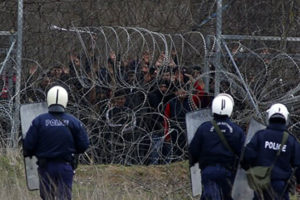Norway Attacks and Europe’s Failed Immigration Policies
The events in Norway were in a twisted way the product of Western ideas about the rivalry and clashes of civilizations, which persist.PARIS — Forty-three years ago the British politician and classicist Enoch Powell made an over-clever and overwrought speech to a Conservative Party gathering in Birmingham, England. In it he attacked the postwar policy of Britain, under both Labour and Conservative governments, of giving easy admission for British residence and citizenship to Commonwealth citizens.
His speech said such a policy would eventually provide Britain (and by extension, the other European countries) with unassimilable and racially or religiously separatist minorities that would eventually prove a source of social division and popular conflict, and, according to Powell, violence.
A scholarship boy, son of a primary school teacher, Powell at 25 was a full professor of Ancient Greek, and, at 35, the youngest brigadier in the wartime British army. His classical formation inspired a disastrous penultimate flourish to his Birmingham speech. He quoted a sibylline prophecy from Virgil’s Aeneid, in which the spirit foresaw wars, “the River Tiber foaming with much blood.”
This attack on the immigration of non-Europeans into Britain caused newspaper hysteria and political sensation of the kind of which only Britain is (still) capable. It ended Powell’s membership in the Conservative shadow cabinet of Edward Heath, grievously injuring Powell’s own until-then promising political career, leaving him an ostracized backbench figure despised by all “right-thinking” public figures. Following the “foaming with blood” speech, Powell epitomized political incorrectness in Britain for the high-minded, racism for most of the rest, and, for the ignorant or ideologically crazed, Fascism.
His “river” of blood arrived last Saturday, spilled in the saltwater separating the Norwegian island of Utoya from the mainland. A young man, one considering himself a modern Crusader Knight Templar, initiated the “terrible” war that he expects will save European Christian civilization from Marxism and the ultimate threat of Muslim conquest.
Well-armed with agricultural fertilizer explosive, and the most modern infantry munitions (alas, introduced by the American army in Vietnam, a rifle round that tears apart the inside of the victim), he managed to kill 76 people, mostly children. This first battle in Anders Behring Breivik’s new war of civilizations — auxiliary to or a continuation of Professor Samuel Huntington’s and President George W. Bush’s initial war to save the West from Islam — has been won, or so one imagines this Nordic crusader believes, as do his companions, if any exist.
But irony can take us only so far. Enoch Powell was, of course, on to something. You cannot invite or entice a people who are, culturally, radically different from a host population, and make little or no serious effort to discriminate among those who come, or to educate them in the majority culture, and through such means to assimilate them into the society they have joined, without courting disaster.
Americans have always taken immigration for granted, since we are all immigrants come for urgent purposes with the knowledge that we would have to change our lives, norms and cultures in order to have what we thought we wanted.
American immigration commonly is seen in terms of Emma Lazarus’s “wretched refuse” of foreign lands and “huddled masses yearning to breathe free.” That may have been true in the late 19th century, as a result of pogroms and persecution in Eastern Europe, but until then immigration was mostly a matter of colonial development, commercial investment, the search for open lands, government homesteads and free railroad land developments. America was opportunity, not refuge. My own ancestors were free farmers, business investors, religious dissidents or adventurous romantics (my grandfather had to pursue his fiancee to America because her parents had decided that he could not bring a suitable dower to their marriage in the old country).
The modern European policy on immigration was first a search for industrial and agricultural labor, expected to be overwhelmingly male “guest workers” who would go home when there was no more need for them. In most European countries, they were informally segregated or ghettoized, offered poor housing and irrelevant education, discriminated against in employment, and victimized by the police when they predictably reacted.
The British behaved toward them as colonial overlords, dealing only with the “chiefs” of tribes and ignoring the rest. The Germans believed they would all go home to their families in Turkey. The French and Italians were the only people who tried to assimilate them, demanding that they learn the language, behave as patriots, renounce ostentatious foreign religious practices, and unveil and liberate their women, who were expected to take up divorce (as they did). American liberals and feminists were outraged that the French census banned reference to race, religion or original nationality, and the government banned veils in schools and public places.
Didn’t the French believe in freedom?
Equally important in European immigration policy was the idealism that permeated postwar Britain and Western Europe as a whole, after the terrible experience of genocidal racism during the Second World War, and the recent renunciation of colonialism and imperialism, resisted at the time only by France’s Fourth Republic, in Indochina until 1954, and Algeria until 1962. (The United States took over the Vietnam War, making the catastrophic mistake of redefining it as part of the Cold War, and beginning a series of non-Western wars yet to end.)
There is nothing to be done about Europe’s immigrant population. They are arrived, settled, bred and will stay. They have to be assimilated as middle class or better citizens, not treated to apartheid — as has been too often the case. The events in Norway were in a twisted way the product of Western ideas about the rivalry and clashes of civilizations, which persist. Will China be number one? Or will America? Why is the “Arab awakening” a threat, as it is so widely regarded in the U.S.? It may be a threat to Israel, but that is Israel’s choice. Why are relations between the great societies, and the immigrant and host societies of the West, so often phrased in language of war and domination? Why are Americans so terrified of Muslims?
Enoch Powell was no fool. The blood has run. It will run again unless Western governments can defuse the present dangers.
Visit William Pfaff’s Web site for more on his latest book, “The Irony of Manifest Destiny: The Tragedy of America’s Foreign Policy” (Walker & Co., $25), at www.williampfaff.com.
© 2011 Tribune Media Services Inc.
Your support matters…Independent journalism is under threat and overshadowed by heavily funded mainstream media.
You can help level the playing field. Become a member.
Your tax-deductible contribution keeps us digging beneath the headlines to give you thought-provoking, investigative reporting and analysis that unearths what's really happening- without compromise.
Give today to support our courageous, independent journalists.






You need to be a supporter to comment.
There are currently no responses to this article.
Be the first to respond.